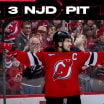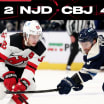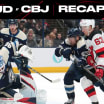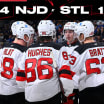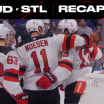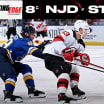The Devils opening game, double-overtime victory over the Rangers seemed to have a cathartic effect on the Eastern Conference Final.
By proving that the Rangers could be defeated at home - even after leading in the third period - the Garden Staters made a statement that now was irrefutable and the Blueshirts knew it full well.
"There's nothing flukey about that team," assured New York defenseman Brian Leetch. "We know we've got our work cut out for us."
A future Hall of Famer, Leetch specifically was pointing to Game 2, also at The Garden. It took only that opening game to magnify the importance of the follow-up while the I.Q, - Intensity Quotient - grew.
SUNDAYS WITH STAN: Can the Devils Do It Again?
After surprising in the Rangers with a road victory in Game 1, could New Jersey pull off a two-game sweep?
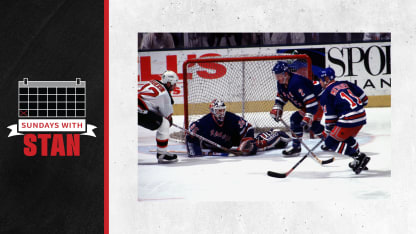
By
Stan Fischler
Special to NHL.com
sundays with stan
DEVILS-RANGERS, 1994 EASTERN FINAL
Part 2: Devils Upset Rangers in Game 1
Part 1: Prelude to Historic Series
"The playoff had turned our sporting spring into a magical time," said Rangers radio play-by-play man Howie Rose. "It was like a Yankees-Mets World Series.
"Personally, I was hyper. I couldn't sleep. I would walk around nervously with all kinds of energy."
That exceptional feeling was transmitted to the players, the fans and the rest of the Metropolitan media. Conjecture piled on top of conjecture as members of The Fourth Estate previewed Game 2.
"Stephane Richer's winner in the first game only served to show that New Jersey had big scorers as well as the Rangers," said Devils radio play-by-play analyst Glenn (Chico) Resch.
But everyone knew that the Rangers had as much to fear on the enemy's fourth, oversized offensive unit; otherwise known as "The Crash Line."
Bobby Holik, Randy McKay and Mike Peluso not only could punish the foe with fierce forechecking, but they possessed scoring ability as an extra added attraction.
"Intimidation always has been part of the game," Holik explained. "If we can worry the Rangers with our hitting game, you can bet that we will."
Not that the Rangers were slouches in the physical department. The likes of hulking defenseman Jeff Beukeboom and the pesky Esa Tikanen were effective weapons evening things for the home club.
The aspect that also balanced evenly between the teams was goaltending. Nobody expected Mike Richter to crack, but there was some element of doubt about the rookie Brodeur.
No more.
Richter: "We felt we had the horses to be the best team in the league. We had to respond."
In his history of the series, "Battle of the Hudson," author Tim Sullivan cited the first 73 seconds of the second game as - at the very least - a mini-turning-point in the tournament.
Not surprisingly, it was orchestrated by the Rangers captain, considered by many to be one of the most inspirational players in NHL annals.
Mark Messier won the opening faceoff and then proceeded to knock over Devils like ten-pins. First it was Scott Stevens, then Ken Daneyko, then Bill Guerin.
Meanwhile, the Captain's mates - especially Tikkanen and defenseman Kevin Lowe - joined the attack but, eventually, the puck returned to Messier's wand.
"The Captain carried it in front of the net," wrote Tim Sullivan, "and tucked a backhand beauty through the goaltender's five-hole, ending a shift for the ages - just 1:13 into Game Two."
Unquestionably, Messier was sending a message to the crowd, to his teammates and, mostly, to the Devils that the Visitors would have their hands full in this gorgeous Game 2.
For sure, the Rangers bench picked up on the frequency and carried it to the ice. When Lemaire countered with his Crash Line, Keenan responded by sending out Steve Larmer and Stephane Matteau.
In a vivid example of the bromide, "Turnabout is fair play," the Rangers pair blitzed Holik & Co. further setting the Devils back on their heels.
Still it was only a 1-0 game with plenty of minutes left in the first period and two more sessions after that. "They did get us off our game," Holik allowed, "but our line soon got going; it was that we couldn't beat Richter."
The Rangers peripatetic goalie had faced 48 shots in Game 1, but it was easier the second time around. Not that the Devils were transfixed; far from it.
"We were on our heels a lot," Daneyko remembered, "but we still were in the game. Heck we were only a goal down well into the second period."
But what they couldn't do was get the offense out of first gear. Or, as one wire service reporter noted: "Lemaire is using his Crash Line more than his scorers. He's trying to get something going any way he can."
Richter ensured that the magician behind the New Jersey bench would not pull a rabbit out of his hat this time. The second period ended 1-0 despite the Devils enjoying a five-on-three power play.
The Rangers seemed unconcerned that their lead was merely a gossamer string strong. After skating out after the intermission, they captured the momentum just as they had in the game's opening minutes.
"This was a confident team," said Keenan, "and I just let them play their game."
Smart.
Not much past the opening faceeoff the Rangers got Brodeur's goat and, for the first time, the rookie goalie was fazed by a Rangers goal.
Granted that by today's stricter standards, the red light would have been deleted because of "goalie interference," but in 1994 just about anything counted.
During the Rangers offensive, Leetch fired a shot from the point which Brodeur saved. However the rebound found Sergei Nemchinov on the prowl for the rubber.
Working to distract Brodeur, Tikanen was upended by Daneyko as he headed toward the crease. Esa easily could have applied the brakes but, instead, he skidded into Brodeur.
Before Marty had a chance to regain his position - not to mention his poise - Nemchinov easily fired the rubber into the empty net.
What could have been Brodeur's 26th save turned out to be the Rangers second goal. Nor was there an official NHL War Room to disallow it.
Frustrated and unable to muster a meaningful attack, the traditionally disciplined Devils lost their cool. Seizing the opportunities, the Rangers peppered Brodeur, adding more goals to their lead.
When the margin became 4-0, Lemaire chose to give Marty a rest and Chris Terreri took over the crease. Brodeur had made 36 saves and received precious little help on this night. It was all Rangers.
Terreri finished the 4-0 loss with one save while Lemaire left the media wondering which of his two goalies would start Game 3. It seemed like a re-creation of the Devils dilemma after Game 2 in Boston.
"I'm going to take it game by game," is all Jacques-Be-Nimble would allow.
Nobody had to tell Lemaire that his skaters had to be more mindful - and muscular - about handling Messier, not to mention Leetch and the fellow who messed up Marty, Tikanen.
"But when all was said and done," concluded author Sullivan, "Game Two was all red, white and blue!"
Having returned to their home in East Rutherford, the Lemaire-Lamoriello leadership group huddled over how to blunt the Blueshirts. The Terreri option was on the table; that was for sure.
"We felt comfortable with either Chris or Marty," said captain Scott Stevens. "There was no way Marty was to blame for us losing 4-0. We owe our goaltender some goals."
Confidence was another issue but playing before the home, New Jersey, fans would be a tonic and, after all, the series was tied at one apiece.
"We still had confidence in ourselves," said Holik. "Balance was there; defense was there and so was our goaltending. The feeling was that we still could take them."
As a rule, the winner of Game 3 in a best-of-seven tourney often - in the long run - takes the series.
"One-One means that we're still even," added Guerin. "Now we'll see who's better."




